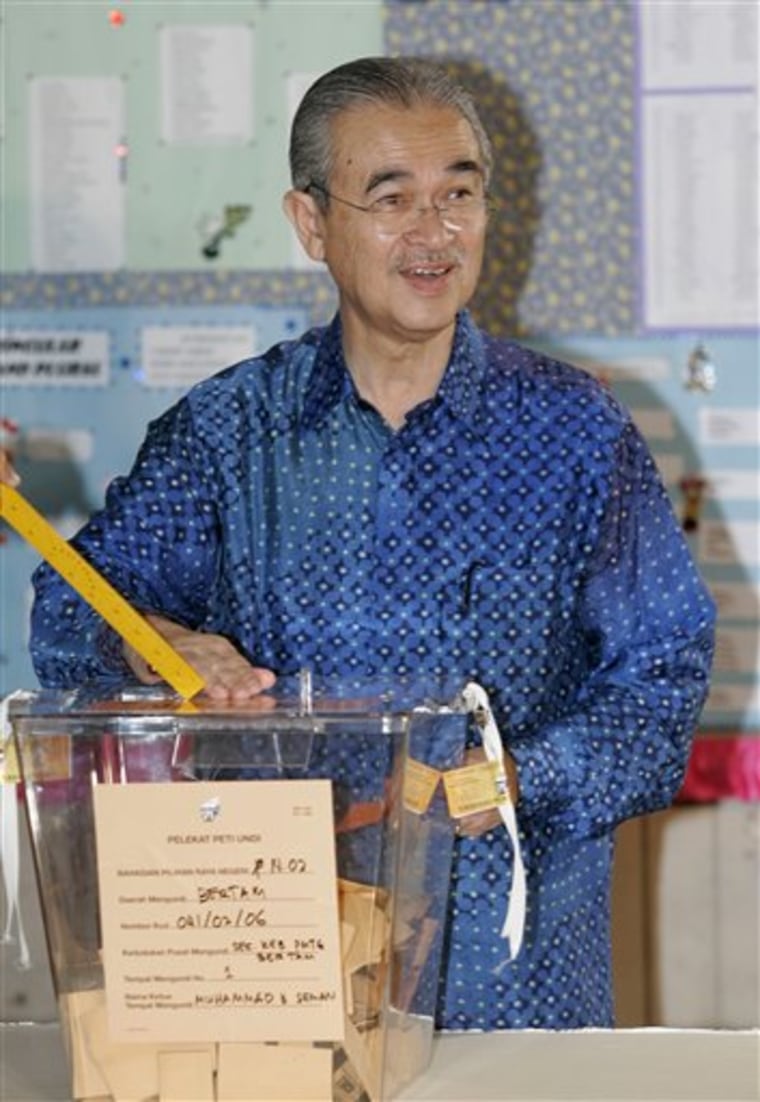Malaysia's ruling coalition on Saturday suffered its biggest electoral upset ever, losing control of four state governments and more than one-third of parliament in a show of frustration over racial tensions, crime and corruption.
It was a humiliating outcome for the National Front coalition, which has governed Malaysia since independence from Britain in 1957, and raised questions about the political future of Prime Minister Abdullah Ahmad Badawi.
At the federal level, the coalition failed to win a two-thirds majority in the 222-seat Parliament for the first time since 1969. Instead it had to be satisfied with a simple majority, winning 139 of the 220 seats for which results had been announced by the Election Commission.
Even if it wins the remaining two seats it would fall short of the 148 needed for a two-thirds majority.
It was a stunning reversal of fortunes for Abdullah, who had led the Front to its best ever result in the last elections in 2004, winning 91 percent of the parliamentary seats and 12 of Malaysia's 13 states.
"As of now we have obtained a simple majority," said Abdullah, looking grim as he addressed reporters with his wife, Jeanne, and deputy Prime Minister Najib Razak by his side.
He said he would meet the constitutional monarch Sunday to stake claim on a new government, and dismissed suggestions that he would face pressure from party members to step down.
"I don't know who would pressure me. There is nothing at this time," he said.
Simultaneous elections also were being held for local assemblies in 12 Malaysian states. The 13th state of Sarawak recently held elections. The National Front controls all states except Kelantan, ruled by the opposition Pan-Malaysian Islamic Party, or PAS.
Reforms not delivered
A key issue in the elections was the disillusionment among ethnic Chinese and Indians, who have complained about religious discrimination and a 37-year-old affirmative action program giving the majority Muslim Malays preference in government jobs, business and education.
"The disenchantment within non-Malays this time ... is a real change from patterns from the past. It is a threat" to Prime Minister Abdullah Ahmad Badawi, said Bridget Welsh, a Southeast Asia expert at Johns Hopkins University who was in Malaysia to monitor the polls.
A Muslim scholar, Abdullah rode to popularity in 2004 promising to root out corruption, fight crime, bring down prices and create a racially peaceful society.
"Many of those reforms have not been delivered. That has made him vulnerable. He said 'I will bring change' and he hasn't brought change," said Welsh.
In a last-minute appeal to voters late Friday, the 68-year-old Abdullah said on TV, "You have to vote for our future. ... What will happen if there is chaos and there is instability?"
Malays make up 60 percent of Malaysia's 27 million people, and form the bulk of voters for Abdullah's United Malays National Organization. The party dominates the governing coalition, which also includes Chinese and Indian-based parties in a power-sharing arrangement that has largely ensured racial peace in this multiethnic country.
Opposition parties take aim
But recent ethnic tensions spilled into the streets last November, when tens of thousands of people held a rare anti-government protest in Kuala Lumpur. The protests were the most serious since the deadly 1969 Malay-Chinese riots, which followed elections in which the Front failed to get a two-thirds majority.
Opposition parties — the Islamic PAS, the Chinese-dominated Democratic Action Party and former Deputy Prime Minister's Anwar Ibrahim People's Justice Party — say their aim this time is to deny the Front a two-thirds majority.
The opposition's chances do not seem good. It admits it is hampered by an electoral system that favors the National Front: the government gerrymanders constituencies to ensure its supporters dominate a district; the media are government controlled and give very little space to the opposition, which has turned to the Internet.
Anwar and other opposition leaders also have questioned voter registration lists, saying they were prone to manipulation because they allegedly contained dead people or individual addresses with hundreds of voters.
New York-based Human Rights Watch said earlier the uneven playing field makes a fair vote doubtful. Foreign elections observers are not allowed.
Law Minister Nazri Abdul Aziz denied the allegations, saying the opposition parties' active participation shows the elections are free and fair. The Election Commission also has denied irregularities.
